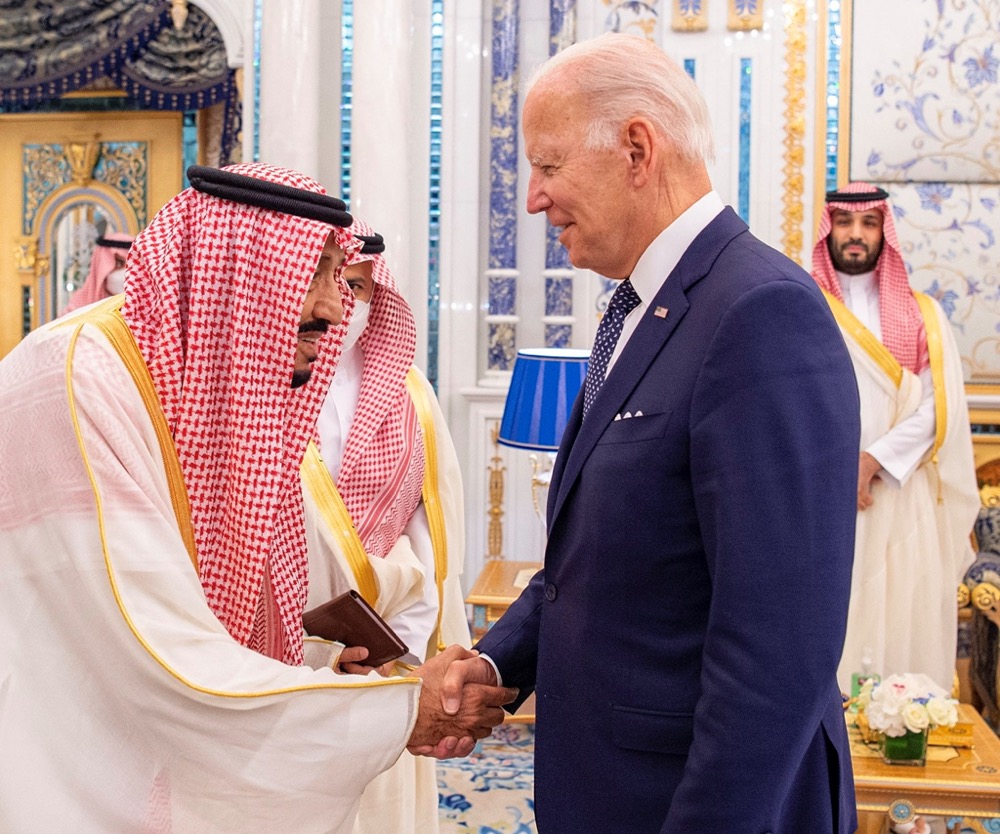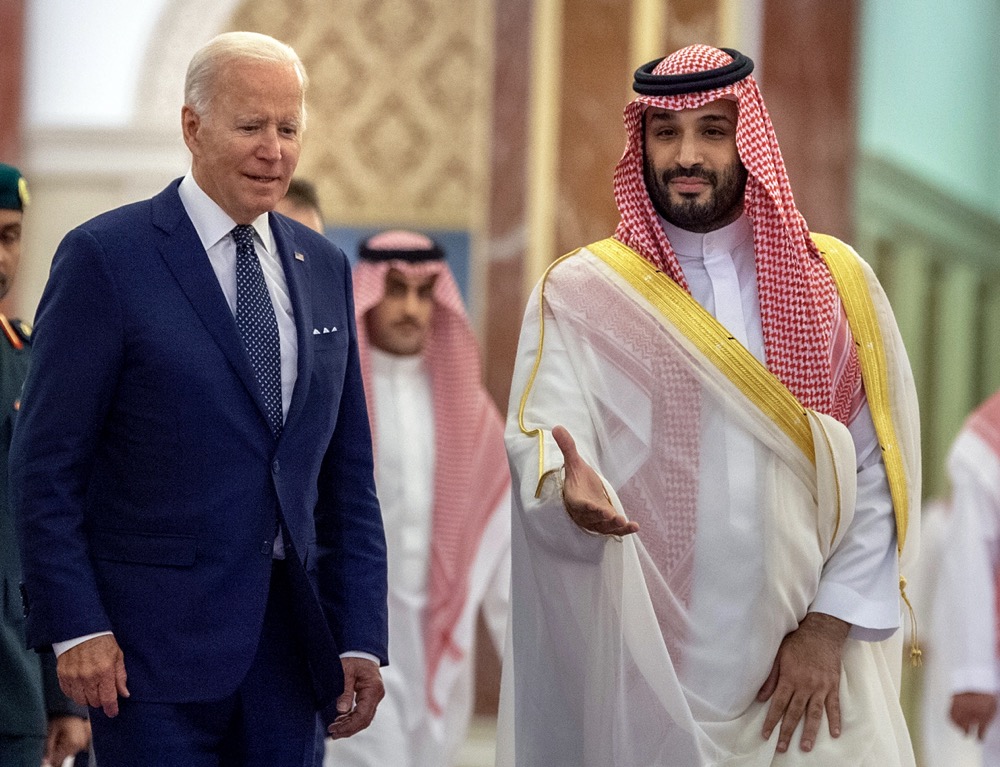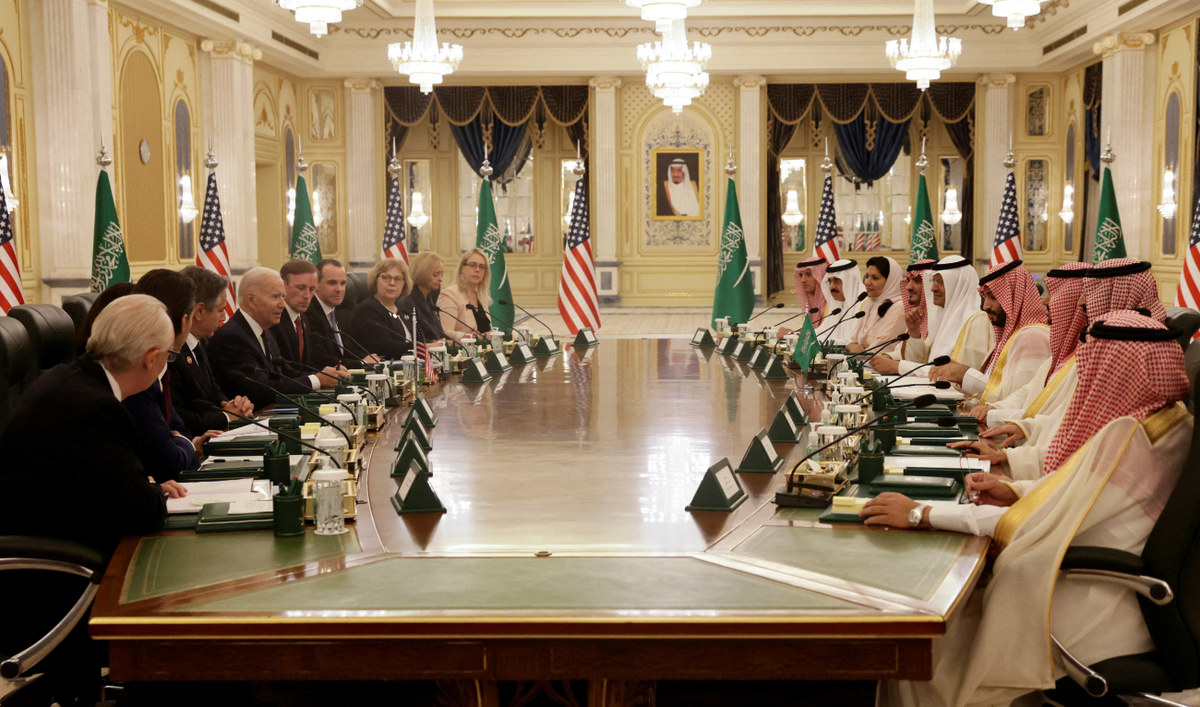JEDDAH: Hours after US President Joe Biden arrived in Jeddah for talks with the Saudi leadership, Adel Al-Jubeir, the Kingdom’s minister of state for foreign affairs, deemed the visit a great success.
In a wide-ranging interview with Arab News on Friday evening, after a packed day of meetings between the US president’s delegation and Saudi officials, Al-Jubeir highlighted the importance of the historic relationship.
“Every visit by an American president to Saudi Arabia is a success, and every visit by a Saudi king or a Saudi crown prince to the US is a success,” Al-Jubeir told Arab News.
“The two countries are allies and partners and have been for eight decades. They have tremendous interests at stake, and they have tremendous challenges that they both are working together to confront.”

King Salman welcomed Joe Biden to Al-Salam Palace on Friday. (SPA)
Biden’s visit “symbolizes in very clear terms the importance of the relationship, the importance of the Kingdom of Saudi Arabia to the US, and to global peace and security,” he added.
On Friday afternoon, shortly after his bilateral meeting with King Salman, the US president and his advisers sat down with Saudi Crown Prince Mohammed bin Salman and other ministers for a summit meeting, which set the tone for future relations.
Citing the many examples of cooperation, Al-Jubeir said: “The two countries work very closely with regards to energy security, with regards to combating climate change, and with regards to providing food security for countries that are suffering because of shortages. They work together to ensure the logistics of global supplies.”
The Saudi minister was particularly keen to highlight new frameworks of cooperation with regards to technology, infrastructure, and health services.
“They work together to enhance and advance connectivity through 5G and 6G as well as exploration of outer space,” said Al-Jubeir. “They also work together in terms of dealing with pandemics. They ensure that we have in place a mechanism to deal with future pandemics more effectively.”
This same spirit of cooperation, Al-Jubeir stressed, applies to the diplomatic and humanitarian spheres.
“They are working together in terms of political and military issues in confronting Iran and supporting Iraq and dealing with the crises in Syria, Lebanon, Israel, Palestine, in Yemen, in the Horn of Africa, in Libya, and in the G5 countries of the Sahel,” he said.
“They are working together with Afghanistan to ensure it does not become a safe haven for terrorists and that it moves forward and becomes a normal country in which normal men and women can lead normal lives.”
Beyond these shared interests and challenges, however, Al-Jubeir said the strength of the Saudi-US relationship, established eight decades ago, hinges upon not only its longevity but also the two nations’ shared principles.
“We want to make sure that, looking forward to the next 80 years, we have a relationship that’s firmly anchored in how we want to move forward,” Al-Jubeir said.
On why there has been so much skepticism that preceded Biden’s visit to Saudi Arabia, Al-Jubeir said: “Maybe the skeptics are people looking for theatrics or drama. The reality, however, is that this relationship is very solid. This relationship is very important. And this relationship keeps growing and going from strength to strength.”
Indeed, reciprocal visits by US and Saudi leaders are a well-established tradition.
“We have had summits between American presidents and Saudi kings since the time of King Abdulaziz. And we have had summits between American presidents and the GCC countries since 2015, when the first one took place at Camp David with President Barack Obama.

Joe Biden met with Crown Prince Mohammed bin Salman. (SPA)
“We had them in 2017 with President Trump. We will have them tomorrow (Saturday) with President Biden. So I can’t tell you what makes the skeptics tick. That’s their issue. But I can tell you the reality of it is that all of the challenges and all of the areas where we’re working together that I mentioned earlier have been going on uninterrupted.”
One significant development on Friday was Saudi Arabia’s decision to open its airspace to commercial flights to and from Israel for the first time. Biden was the first US president to fly from Ben Gurion Airport near Tel Aviv to King Abdulaziz International Airport in Jeddah.
Commenting on the move, described by Biden on Friday as “historic,” Al-Jubeir said the announcement came in accordance with the Kingdom’s Vision 2030 social and economic reform agenda, which envisions Saudi Arabia as a regional travel hub.
“As part of Vision 2030, Saudi Arabia is seeking to diversify its economy,” said Al-Jubeir. “Among the areas for diversification are recreation, entertainment, and transportation.
“Saudi Arabia is placed to be a natural hub because of its location between Asia, Africa and Europe. Fourteen percent of the world’s marine traffic runs through the Red Sea, and Saudi Arabia can be a hub for air transportation connecting these three continents.
“It is impossible to become a hub unless third countries have the right to fly over your territory in accordance with the Chicago Convention of 1944. Saudi Arabia will become an air hub essentially by default because of its geographic location just as it can become a hub for shipping.”
Indeed, if Saudi Arabia wishes to become a world-class venue for international sporting events, “it has to be open to the whole world and it cannot exclude countries from participating in those events,” said Al-Jubeir.
“This is all part of the country’s becoming a destination for sports and recreation events, as well as its aim to become a transportation and logistics hub connecting three continents.”
Ahead of Biden’s arrival in Saudi Arabia, observers expected the issue of oil production to feature prominently on the summit agenda, in light of spiraling global energy prices as a result of the war in Ukraine and the resultant Western embargo on Russian oil and gas.
“Saudi Arabia’s policy on oil has been to try to seek balance in the energy markets, to make sure that the markets are adequately supplied and that there are no shortages,” said Al-Jubeir.
“Now, when you have dislocations in the markets because of geopolitics or because of dislocations in the price of other energy, whether it is coal or natural gas, and they skyrocket and they pull up the price of crude oil, that really has nothing to do with a shortage of crude oil as much as other factors.”
He added: “With regards to the price of gasoline in the US, that’s really a function of the lack of refining capacity. The US has not built a refinery in more than 40 years and it has something to do with a regulatory environment that has now led to having many different blends of gasoline in different regions of the US, and that makes it complicated to supply gasoline into the American market.”
Therefore, he added, “increasing crude oil supplies to the US is not going to alleviate the problem. But going back to the global situation, Saudi Arabia’s policy is to work within OPEC and OPEC+ to make sure the markets are adequately supplied and we have been doing that.
“I believe that the Biden administration is aware of what we have done. If you look at only the last year alone, Saudi Arabia was able to increase oil production on a fairly regular basis.”

A working meeting between President Biden’s delegation and Crown Prince Mohammed bin Salman and Saudi officials produced a number of MoUs on Friday. (Reuters)
In order to meet the demands of the market, Saudi Arabia “will continue to assess market needs and make decisions according to those needs.”
Referencing Saudi Arabia and America’s historical bonds of friendship, including how the US sent troops to the region in 1990 to help repel Saddam Hussein’s Iraqi forces from neighboring Kuwait, Al-Jubeir said the same principles of security cooperation apply today.
“The US is committed to the security of the Gulf, and committed to the security of Saudi Arabia. That has been the case since President Franklin D. Roosevelt met the late King Abdulaziz,” he said.
“Every American president has articulated that and we saw it expressed very clearly in the deployment of 500,000 American troops in 1990 to Saudi Arabia to protect it from an Iraqi incursion after the invasion of Kuwait and then to evict Saddam Hussein from Kuwait and liberate the country.
“(Sending) 500,000 American soldiers to the Kingdom and to the Gulf (was) an incredibly powerful testament to America’s commitment to the security of the Gulf. The US is the largest supplier of defense equipment to the Kingdom of Saudi Arabia and to most countries in the Gulf and the US has the largest presence in the region.
“We have joint exercises. We have joint transfers of technology. We have joint operations that we and the GCC countries are engaged in with the US. We try to broaden and deepen and expand all of them in order to enhance the security of our region. The issues are ongoing and will continue to increase in the future.”
However, Al-Jubeir underlined that Saudi Arabia is an independent country that relies as much as it can on itself for its defense and for its deterrent capabilities.
“Saudi Arabia has not been shy about acquiring defense equipment from various sources, depending on what is best suited for its armed forces,” he said.
“We have extensive programs with the US, and ‘we’ means the GCC. Those programs involve working on ballistic missile defense systems, working on demining operations, and working with special forces.
“You can see a number of these were established or begun after the 2015 US-GCC Summit at Camp David after which a final joint statement came out that listed all of the items and these are presently all works in progress.”
























